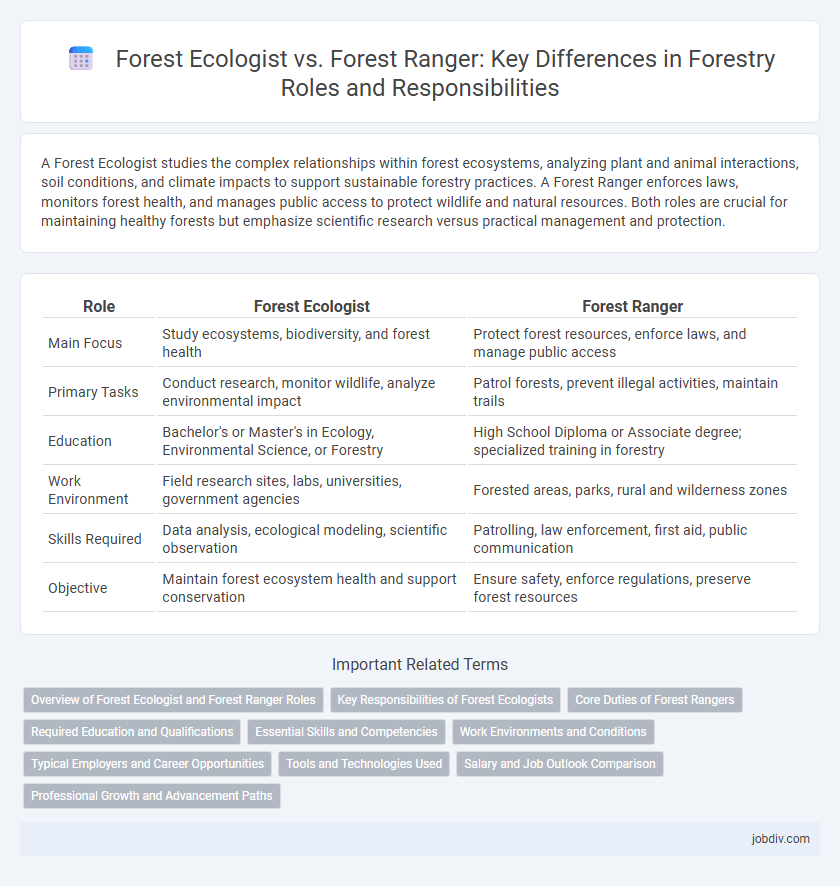A Forest Ecologist studies the complex relationships within forest ecosystems, analyzing plant and animal interactions, soil conditions, and climate impacts to support sustainable forestry practices. A Forest Ranger enforces laws, monitors forest health, and manages public access to protect wildlife and natural resources. Both roles are crucial for maintaining healthy forests but emphasize scientific research versus practical management and protection.
Table of Comparison
| Role | Forest Ecologist | Forest Ranger |
|---|---|---|
| Main Focus | Study ecosystems, biodiversity, and forest health | Protect forest resources, enforce laws, and manage public access |
| Primary Tasks | Conduct research, monitor wildlife, analyze environmental impact | Patrol forests, prevent illegal activities, maintain trails |
| Education | Bachelor's or Master's in Ecology, Environmental Science, or Forestry | High School Diploma or Associate degree; specialized training in forestry |
| Work Environment | Field research sites, labs, universities, government agencies | Forested areas, parks, rural and wilderness zones |
| Skills Required | Data analysis, ecological modeling, scientific observation | Patrolling, law enforcement, first aid, public communication |
| Objective | Maintain forest ecosystem health and support conservation | Ensure safety, enforce regulations, preserve forest resources |
Overview of Forest Ecologist and Forest Ranger Roles
Forest Ecologists study forest ecosystems, analyzing biodiversity, soil quality, and climate impact to promote sustainable management and conservation practices. Forest Rangers focus on protecting forests through monitoring wildlife, enforcing regulations, preventing illegal activities, and managing fire control efforts. Both roles collaborate to maintain forest health, but Ecologists emphasize research and data while Rangers prioritize field enforcement and safety.
Key Responsibilities of Forest Ecologists
Forest ecologists conduct scientific research to analyze forest ecosystems, focusing on biodiversity, soil health, and the impacts of climate change on forest dynamics. They develop strategies for sustainable forest management by monitoring tree growth, species interactions, and ecosystem services. Their key responsibilities include data collection, ecological modeling, and advising policymakers on conservation and restoration initiatives.
Core Duties of Forest Rangers
Forest Rangers primarily focus on protecting and managing forest resources by enforcing laws, monitoring wildlife populations, and preventing illegal activities such as logging and poaching. They conduct regular patrols to assess forest health, respond to emergencies like wildfires, and educate the public on conservation practices. Their core duties emphasize fieldwork, safety enforcement, and direct interaction with the environment to maintain forest sustainability and public safety.
Required Education and Qualifications
Forest ecologists typically require a bachelor's degree in ecology, forestry, environmental science, or a related field, with many positions favoring a master's or doctoral degree for advanced research roles. Forest rangers generally need at least a high school diploma or equivalent, but most employers prefer candidates with an associate or bachelor's degree in forestry, natural resource management, or public administration. Both roles benefit from certifications such as the Society of American Foresters (SAF) certification or state-specific credentials to enhance job prospects and credibility.
Essential Skills and Competencies
Forest ecologists require strong analytical skills, expertise in vegetation ecology, and proficiency in data collection and interpretation to assess forest health and biodiversity. Forest rangers must possess practical skills in navigation, wildlife management, and law enforcement to effectively protect forests and enforce regulations. Both roles demand excellent communication skills and a deep understanding of forest ecosystems to support sustainable forest management.
Work Environments and Conditions
Forest ecologists primarily work in research stations, universities, and outdoor field sites, conducting ecological studies to understand forest ecosystems and biodiversity. Forest rangers operate mainly in national parks, forest reserves, and protected areas, focusing on conservation enforcement, public safety, and resource management. Work conditions for forest ecologists often involve extended fieldwork in variable weather, while forest rangers face physically demanding tasks with potential exposure to hazards like wildlife and rough terrain.
Typical Employers and Career Opportunities
Forest ecologists typically find employment with environmental consulting firms, government agencies such as the U.S. Forest Service, research institutions, and conservation organizations. Forest rangers are commonly employed by national and state parks, forestry departments, and wildlife management agencies, focusing on fieldwork and public safety. Career opportunities for forest ecologists often involve research, ecosystem management, and policy advising, while forest rangers advance in roles related to park supervision, law enforcement, and resource protection.
Tools and Technologies Used
Forest ecologists utilize advanced tools such as GIS (Geographic Information Systems), remote sensing technology, and soil and vegetation sampling equipment to analyze ecosystem health and biodiversity. Forest rangers primarily rely on GPS devices, two-way radios, and firefighting gear to manage forest resources, enforce regulations, and respond to emergencies in the field. Both professions increasingly incorporate drone technology for monitoring forest conditions and assessing environmental changes efficiently.
Salary and Job Outlook Comparison
Forest ecologists typically earn between $50,000 and $80,000 annually, reflecting their specialized role in studying forest ecosystems, with job growth projected at 5% over the next decade due to increasing environmental research demands. Forest rangers have an average salary range of $40,000 to $65,000, focused on conserving and managing forest resources, with a steady job outlook near 4% growth as public land management continues to expand. Both careers offer stable employment opportunities, but forest ecologists generally command higher salaries due to advanced education requirements and scientific expertise.
Professional Growth and Advancement Paths
Forest ecologists typically advance by gaining expertise in ecosystem research, securing specialized degrees, and contributing to scientific studies that inform sustainable forest management. Forest rangers progress through practical experience in forest protection, emergency response training, and obtaining certifications related to wildlife management and fire suppression. Both roles benefit from continuous education and fieldwork, but forest ecologists often move into academic or policy advisory positions, while forest rangers frequently ascend to supervisory or administrative roles within forestry agencies.
Forest Ecologist vs Forest Ranger Infographic

 jobdiv.com
jobdiv.com